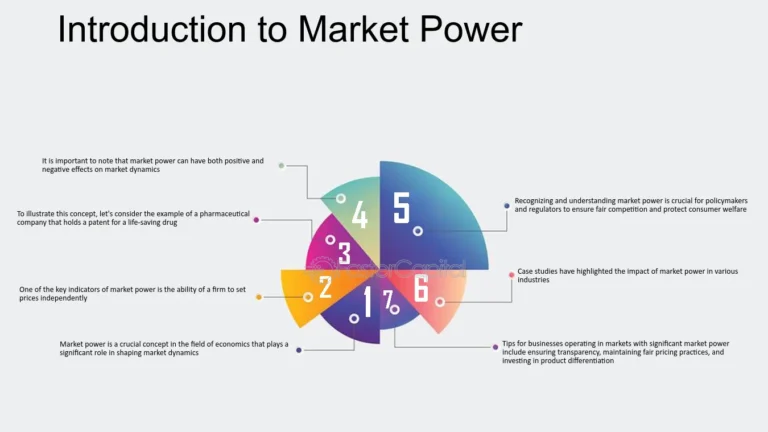In the world of economics, the concept of marketplace energy holds a principal position, dictating the dynamics of industries, shaping patron reports, and influencing regulatory regulations. With its multifaceted implications, marketplace energy unveils a complex interplay between firms, customers, and regulators, frequently defining the very fabric of modern-day economies. Let’s delve into the intricacies of Market Power, exploring its definition, manifestations, outcomes, and the measures employed to regulate it.
Understanding Market Power: Beyond Supply and Demand
At its middle, market strength refers back to the capability of a firm or a group of companies to influence charges, outputs, and market conditions. Unlike best opposition, wherein numerous small firms perform with out a individual have an impact on over prices, marketplace strength arises while a organization holds a dominant position because of elements inclusive of technological superiority, emblem popularity, economies of scale, or manipulate over vital sources.
Manifestations of Market Power
Market energy manifests itself in diverse bureaucracy throughout specific industries, each supplying specific challenges and implications:
Monopoly:
In a monopoly, a single firm dominates the entire marketplace, exerting large control over costs and outputs. This often leads to better costs for purchasers and stifled innovation, as the absence of opposition reduces incentives for efficiency and first-rate improvements.
Oligopoly:
Oligopolistic markets feature a small range of huge companies, each able to influencing market results. Collusion amongst these corporations can result in rate-fixing and anti-aggressive behavior, disadvantaging clients and smaller competitors.
Monopsony:
While less mentioned than monopoly, monopsony occurs while a unmarried buyer controls the market, exerting impact over fees and phrases of trade with providers. This can result in reduced wages and lower nice standards for items and offerings.
Monopolistic Competition:
In markets characterized with the aid of monopolistic competition, corporations differentiate their merchandise through branding, advertising, or product features, letting them wield a few diploma of marketplace energy. However, this electricity is confined by way of the presence of near substitutes and the capability for new entrants.
Implications of Market Power
The ramifications of marketplace power make bigger past mere financial transactions, permeating into social, political, and regulatory domain names:
Consumer Welfare:
Market electricity frequently outcomes in higher costs, decreased choice, and diminished great for purchasers. In monopolistic or oligopolistic markets, clients can also face constrained alternatives and bear the brunt of anti-aggressive practices.
Innovation:
Competitive markets incentivize corporations to innovate and enhance efficiency so as to benefit an part over opponents. However, immoderate market strength can stifle innovation, as dominant corporations have much less impetus to invest in research and development or undertake new technology.
Income Inequality:
Concentration of marketplace electricity in the palms of some corporations can exacerbate earnings inequality by letting them extract financial rents at the fee of customers, employees, and smaller competitors.
Regulatory Challenges:
Policymakers face the daunting assignment of regulating marketplace electricity to make sure fair competition and shield purchaser pastimes at the same time as keeping off stifling innovation or impeding financial boom. Striking the proper balance requires a nuanced knowledge of market dynamics and cautious calibration of regulatory interventions.
Regulating Market Power: A Delicate Balancing Act
Efforts to lower market strength and promote opposition span a spectrum of regulatory measures, starting from antitrust laws to region-specific rules:
Antitrust Enforcement:
Antitrust legal guidelines goal to save you anti-competitive practices which include price-fixing, collusion, market allocation, and monopolization. Regulatory authorities actively display markets for signs of abuse of Market Power and take enforcement movements to maintain opposition and shield client welfare.
Merger Control:
Mergers and acquisitions have the potential to concentrate market energy within the hands of some companies, thereby lowering opposition. Merger manipulate regulations empower antitrust government to scrutinize proposed mergers and intervene while they are deemed to drastically lessen competition.
Sector-Specific Regulation:
Some industries, together with telecommunications, strength, and finance, are challenge to quarter-specific guidelines geared toward selling competition, making sure customer protection, and safeguarding in opposition to systemic dangers. These policies regularly involve charge controls, licensing necessities, and purchaser safeguards to mitigate the outcomes of market electricity.
Market Design:
Regulatory interventions in marketplace layout, inclusive of auctions, spectrum allocation, and infrastructure get right of entry to guidelines, can have an effect on market shape and mitigate the workout of market electricity by using dominant players. By fostering aggressive entry and making sure equitable access to vital resources, marketplace design measures play a vital position in promoting competition.
Navigating the Evolving Landscape of Market Power
As economies evolve and industries go through speedy changes pushed via technological advancements and globalization, the dynamics of marketplace electricity maintain to conform. Emerging trends such as platform economies, digitalization, and the rise of information-pushed enterprise fashions pose new demanding situations for regulators searching for to maintain competition and save you the emergence of latest forms of marketplace strength.
Platform Economies and Digital Markets:
Platforms which include Amazon, Google, and Facebook wield monstrous market energy through virtue of their manipulate over considerable quantities of user statistics, community consequences, and proprietary algorithms. Regulating those systems poses particular demanding situations because of their worldwide attain, move-marketplace interactions, and the intangible nature of digital belongings.
Data Privacy and Consumer Protection:
The proliferation of records-pushed enterprise models raises concerns approximately consumer privacy, information protection, and the capacity for exploitation of personal records through dominant firms. Regulatory frameworks consisting of the General Data Protection Regulation (GDPR) are searching for to deal with those worries through implementing strict requirements on records series, processing, and consent.
Emerging Technologies and Market Disruption:
Technological innovations together with synthetic intelligence, blockchain, and the Internet of Things have the capacity to disrupt traditional markets, create new business models, and reshape the aggressive panorama. Regulators must strike a sensitive balance between fostering innovation and preventing the emergence of monopolistic control over rising technology.
The Dynamics of Market Power: Balancing Act in Business
For companies, marketplace electricity serves as each a boon and a bane, offering opportunities for growth and profitability at the same time as entailing the dangers of regulatory scrutiny and competitive backlash. Striving to attain and preserve market energy necessitates a delicate equilibrium between innovation, differentiation, and strategic positioning.
Innovation serves as a robust driver of marketplace electricity, permitting firms to pioneer groundbreaking merchandise, services, or strategies that redefine industry requirements and seize consumer creativeness. From Apple’s revolutionary iPhone to Tesla’s trailblazing electric automobiles, innovation has been the cornerstone of marketplace electricity, raising agencies from mere gamers to industry titans.
However, innovation on my own does now not suffice; differentiation performs a pivotal position in carving out a gap amidst fierce competition. By providing precise cost propositions, tailored reviews, or superior great, companies can cultivate logo loyalty, insulating themselves from price wars and commoditization. Coca-Cola’s timeless logo photo, Starbucks’ immersive espresso way of life, and Disney’s captivating storytelling exemplify the potency of differentiation in cultivating enduring market strength.
Strategic positioning, in the meantime, involves a meticulous alignment of sources, competencies, and market insights to capitalize on emerging developments, take advantage of untapped opportunities, and outmaneuver rivals. Whether via vertical integration, horizontal growth, or strategic alliances, firms can reinforce their market positions, erecting boundaries to entry and augmenting their bargaining power.
Conclusion
In the problematic tapestry of modern-day economies, marketplace power emerges as a pivotal pressure shaping the conduct of corporations, the experiences of consumers, and the trajectory of regulatory policies. While market strength can power innovation, performance, and monetary growth, unchecked power can result in anti-aggressive behavior, decreased patron welfare, and entrenched inequality. Navigating the complexities of market electricity calls for a concerted attempt from policymakers, regulators, industry members, and purchaser advocates to strike a sensitive stability between fostering competition and safeguarding in opposition to abuse of marketplace power. By embracing innovation, selling transparency, and upholding the concepts of honest competition, societies can harness the transformative ability of market strength to create inclusive, dynamic, and resilient economies for the advantage of all.

